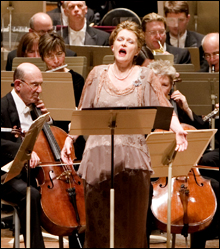
AS THE WOOD DOVE: Who could believe she was ill? |
We were very lucky, here in Boston, to have had so many chances to hear Lorraine Hunt Lieberson, who died in Santa Fe last Monday at the age of 52. She started out as a violist in the Emmanuel Orchestra, and her voice — first as a soprano, then as a mezzo-soprano — had the dark, rich timbre of her former instrument. It was a great voice, one that could be heard in the last row of the Metropolitan Opera House, where her rising star had taken her, as the poignantly blowsy Myrtle Wilson in the 1999 world premiere of John Harbison’s The Great Gatsby. (Her first line was, “It’s hell, but it’s home.”) But it was also a voice that could draw you into the most intimate songs by Mahler and Brahms and Harbison. (Her recording of Harbison’s Elizabeth Bishop cycle, North and South, should be released this fall.) She sang everything from inside — heroic roles like the tragic Dido in Berlioz’s Les Troyens (in a towering, heartbreaking performance at the Met), comic roles like the sparkling Beatrice in Berlioz’s Béatrice et Bénédict, and scintillating, sexy roles like Carmen. (She sang these last two here with Boston Lyric Opera.) With uncanny empathy, she entered into the soul, it seemed, of every character she played.French music was one of her specialties. Her seamless phrasing was perfect for the eloquent contours of Berlioz and Debussy. One of her greatest achievements was as the mysterious, otherworldly Mélisande in Debussy’s Pelléas et Mélisande, with the BSO under Bernard Haitink. Her BSO debut, in 1987 under Seiji Ozawa, was a song for Mélisande that Fauré cut from his Pelléas et Mélisande Suite; she recorded it with Ozawa — her first recording — a year later.
She was also particularly thrilling in Mozart and Handel. Still a soprano, she sang a strung-out Donna Elvira in the Peter Sellars/Craig Smith Don Giovanni (the one set in the South Bronx). One of the greatest opera performances I ever saw was her Sesto, the vengeful son of the assassinated Pompey, in Handel’s Giulio Cesare. Her ferocity was hair-raising — power squashed on her studio recordings under Nicholas McGegan but fully present on a thrilling videotape of the Sellars/Smith production. I saw the production at least five times, and she never held back, yet her fiendishly difficult coloratura was never less than impeccable; and nothing was more beautiful than the moving duet of parting she sang with Mary Westbrook Geha, who played her mother.

Attractive and sexy as she was, she could have also had a career playing “trouser” roles. Her very first opera was Humperdinck’s Hänsel und Gretel, in which she played Hänsel, in a performance at San Quentin. In a 1996 interview on Fresh Air, she told Terry Gross that when she was leaving the prison, without her boy’s wig and flannel shirt, she overheard one of the inmates who’d just seen the opera say to another, “I thought that was a dude with a big ass!” She could have played the diva, but she never lost her sense of humor, especially about herself.
Among her most recent Boston performances were the controversial Bach cantatas staged by Peter Sellars, with Hunt Lieberson as a hospital patient hooked to IVs and yearning for death. The Nonesuch CD, conducted by Craig Smith with oboist Peggy Pearson and the Emmanuel Orchestra, became something of a bestseller. Last November, at the BSO, she sang Neruda Songs, gorgeous, soulful settings of five Neruda love poems composed for her by husband, Peter Lieberson, a BSO co-commission that became a finalist for the Pulitzer Prize in music. Her last Boston appearance was as the lamenting Wood Dove in Schoenberg’s Gurrelieder, which she sang so profoundly at Symphony Hall last February. Hearing her, at the height of her power and artistry, who could believe she was ill?
Lately, her cancellations made almost as much news as her performances. It’s understandable. What could be more disappointing than missing someone you wanted to hear so badly? I could barely wait to see her in the title role of Gluck’s Orfeo, which Mark Morris was scheduled to direct her in at the Met. Like the beloved British contralto of half a century ago, Kathleen Ferrier, whose last role was Orfeo, Hunt Lieberson died much too young, her star still rising. We all hoped she would go on forever.